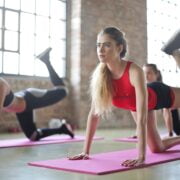
Eating and exercise: 5 tips to maximize your workouts
Proper nutrition is essential for effective workouts. Whether you’re an athlete, a fitness enthusiast, or simply someone looking to improve their overall health and wellness, what you eat plays a crucial role in your exercise performance. Fueling your body with the right nutrients before, during, and after workouts can enhance your energy levels, improve your endurance, and aid in post-workout recovery. In this article, we will explore the importance of proper nutrition for effective workouts and provide tips and suggestions for fueling your body to optimize your exercise performance.
Key Takeaways
- Proper nutrition is crucial for effective workouts.
- Pre-workout snacks and meals should provide energy and be easy to digest.
- Staying hydrated during exercise is important for performance and recovery.
- Protein and carbohydrates are essential for post-workout recovery.
- A balanced diet can improve exercise performance and overall health.
The Importance of Proper Nutrition for Effective Workouts
Nutrition has a direct impact on exercise performance. The food you consume provides the energy and nutrients needed to fuel your workouts. Carbohydrates, protein, and fat are the three macronutrients that play a crucial role in providing energy for physical activity.
Carbohydrates are the body’s primary source of energy. They are broken down into glucose, which is used by the muscles as fuel during exercise. Consuming an adequate amount of carbohydrates before a workout can help maintain glycogen stores in the muscles, preventing fatigue and improving endurance.
Protein is essential for muscle repair and growth. During exercise, muscle fibers break down, and protein helps repair and rebuild these fibers. Consuming protein after a workout can aid in muscle recovery and promote muscle growth.
Fat is another important source of energy during exercise, especially during longer duration activities. It provides a concentrated source of energy and helps maintain steady blood sugar levels.
Fueling Your Body: Pre-Workout Snacks and Meals
What you eat before a workout can significantly impact your performance. It’s important to consume a balanced meal or snack that provides a combination of carbohydrates, protein, and fat.
Some pre-workout snack ideas include a banana with almond butter, Greek yogurt with berries, or a handful of nuts with a piece of fruit. These snacks provide a good balance of carbohydrates, protein, and healthy fats to fuel your workout.
Timing is also crucial when it comes to pre-workout nutrition. It’s best to eat a meal or snack containing carbohydrates and protein about 1-2 hours before your workout. This allows enough time for digestion and absorption of nutrients, providing you with sustained energy throughout your workout.
Hydration: How to Stay Hydrated During Exercise
Proper hydration is essential for exercise performance. When you’re dehydrated, your body cannot function optimally, leading to decreased energy levels, muscle cramps, and reduced endurance.
To stay hydrated before a workout, it’s important to drink water throughout the day leading up to your exercise session. Aim to drink at least 8-10 cups of water per day, and increase your intake if you’re exercising in hot or humid conditions.
During your workout, it’s important to drink water regularly to replace the fluids lost through sweat. Sip on water every 15-20 minutes during exercise, especially if you’re engaging in intense or prolonged physical activity.
After your workout, continue to hydrate by drinking water or consuming hydrating foods such as fruits and vegetables. This will help replenish the fluids lost during exercise and aid in recovery.
Post-Workout Recovery: The Role of Protein and Carbohydrates
After a workout, your body needs nutrients to repair and rebuild muscles, replenish glycogen stores, and promote recovery. Consuming a combination of protein and carbohydrates within 30-60 minutes after exercise can enhance recovery and optimize muscle growth.
Protein is particularly important for post-workout recovery as it provides the building blocks needed for muscle repair and growth. Aim to consume about 20-30 grams of protein after your workout. Good sources of post-workout protein include lean meats, poultry, fish, eggs, dairy products, and plant-based protein sources such as tofu, tempeh, and legumes.
Carbohydrates are also crucial for post-workout recovery as they help replenish glycogen stores in the muscles. Consuming carbohydrates after exercise can also help prevent muscle breakdown and promote muscle growth. Good sources of post-workout carbohydrates include fruits, whole grains, and starchy vegetables.
The Benefits of a Balanced Diet for Exercise Performance
A balanced diet is essential for overall health and exercise performance. It provides the body with the necessary nutrients to function optimally and supports energy production, muscle repair, and recovery.
A balanced diet should include a variety of foods from all food groups, including fruits, vegetables, whole grains, lean proteins, and healthy fats. Each nutrient plays a unique role in supporting exercise performance.
Fruits and vegetables are rich in vitamins, minerals, and antioxidants that help support immune function and reduce inflammation. Whole grains provide a steady source of energy due to their high fiber content. Lean proteins are essential for muscle repair and growth. Healthy fats, such as those found in avocados, nuts, and seeds, provide energy and support hormone production.
Incorporating Strength Training for Optimal Results
Strength training is an important component of any workout routine. It not only helps build strength and muscle mass but also improves bone density, enhances metabolism, and increases overall functional fitness.
Incorporating strength training into your workout routine can be done through various exercises such as weightlifting, bodyweight exercises, or resistance band workouts. Aim to include strength training exercises at least two to three times per week.
When starting a strength training program, it’s important to start with lighter weights or resistance and gradually increase the intensity as your strength improves. It’s also important to focus on proper form and technique to prevent injuries.
Finding the Right Balance: Cardio vs. Strength Training
Both cardio and strength training have their own unique benefits and play a crucial role in overall fitness. Cardiovascular exercise, such as running, swimming, or cycling, helps improve cardiovascular health, burn calories, and increase endurance.
Strength training, on the other hand, helps build lean muscle mass, increase strength, and improve body composition. It also has a positive impact on bone density and metabolism.
Finding the right balance between cardio and strength training depends on your individual goals and preferences. If your goal is to lose weight or improve cardiovascular health, you may want to focus more on cardio exercises. If your goal is to build muscle or improve strength, incorporating more strength training exercises into your routine may be beneficial.
The Role of Rest Days in Your Fitness Routine
Rest days are just as important as exercise days in your fitness routine. They allow your body to recover and repair from the physical stress of exercise, reducing the risk of injury and preventing overtraining.
During rest days, it’s important to prioritize activities that promote relaxation and recovery. This can include activities such as stretching, yoga, foam rolling, or taking a leisurely walk.
It’s also important to listen to your body and give yourself permission to take rest days when needed. Pushing through fatigue or soreness can lead to burnout and hinder progress. Rest days are an essential part of any workout routine and should be incorporated regularly.
Mindful Eating: How to Listen to Your Body’s Needs
Mindful eating is a practice that involves paying attention to your body’s hunger and fullness cues and eating with intention and awareness. It’s about nourishing your body with the right foods and listening to what it needs.
To practice mindful eating, it’s important to slow down and savor each bite of food. Pay attention to the flavors, textures, and sensations of eating. Eat when you’re hungry and stop when you’re satisfied, not overly full.
Listening to your body’s hunger and fullness cues can help you make better food choices and prevent overeating or undereating. It can also help you develop a healthier relationship with food and improve your overall well-being.
Staying Motivated: Tips for Maintaining a Consistent Exercise Routine
Staying motivated to exercise regularly can be challenging, especially when life gets busy or you’re not seeing immediate results. However, consistency is key when it comes to achieving your fitness goals.
One way to stay motivated is to set realistic and achievable goals. Break down your larger goals into smaller, more manageable ones and celebrate your progress along the way.
Finding activities that you enjoy can also help keep you motivated. If you don’t enjoy running, try a dance class or join a sports team. Experiment with different types of exercise until you find something that you genuinely enjoy.
Having a workout buddy or joining a fitness community can also provide accountability and support. Find a friend or join a group that shares similar fitness goals and schedule regular workout sessions together.
Proper nutrition is essential for effective workouts. Fueling your body with the right nutrients before, during, and after exercise can enhance your energy levels, improve your endurance, and aid in post-workout recovery. It’s important to consume a balanced diet that includes a variety of foods from all food groups to support overall health and exercise performance. Additionally, incorporating strength training, finding the right balance between cardio and strength training, prioritizing rest days, practicing mindful eating, and staying motivated are all important factors in maintaining a consistent exercise routine. By prioritizing nutrition and exercise, you can optimize your performance and achieve your fitness goals while improving your overall health and wellness.
If you’re looking to take your workouts to the next level, you won’t want to miss this insightful article from Wave Magnets. In their piece titled “The Power of Magnetic Therapy for Athletic Performance,” they explore how incorporating magnetic therapy into your exercise routine can enhance your performance and recovery. Discover the science behind this innovative approach and learn how it can help you maximize your workouts. Don’t miss out on this fascinating read! Check it out here.
FAQs
What is the relationship between eating and exercise?
Eating and exercise are closely related as the food we consume provides the energy needed for physical activity. Proper nutrition can help maximize the benefits of exercise and improve overall health.
What are some tips for eating before a workout?
It is recommended to eat a meal containing carbohydrates and protein 2-3 hours before a workout. If you don’t have time for a full meal, a small snack containing carbohydrates can provide the necessary energy. Avoid high-fat and high-fiber foods before exercise.
What should I eat after a workout?
After a workout, it is important to consume protein and carbohydrates to help repair and rebuild muscles. A protein shake, Greek yogurt, or a turkey sandwich on whole wheat bread are good options.
How much water should I drink during exercise?
It is recommended to drink 17-20 ounces of water 2-3 hours before exercise and then continue to drink 7-10 ounces every 10-20 minutes during exercise. The amount of water needed may vary depending on the intensity and duration of the workout.
What are some good sources of carbohydrates for energy?
Good sources of carbohydrates for energy include whole grains, fruits, vegetables, and low-fat dairy products. It is important to choose complex carbohydrates that provide sustained energy rather than simple sugars that can cause a quick spike and crash in blood sugar levels.


















